If you thought that your gut was only responsible for digesting food, think again! A group of bacteria and other microorganisms in our digestive tract affect everything from our mood to our immune system. But does it affect our skin also? Is there a link between how we feel inside our gut and how we look?
As a teenager, your parents might have told you that drinking too much spicy food and unhealthy snacks can cause acne or pimples. The truth is that there is a strong gut skin connection that can affect the radiant glow of your skin and your overall appearance. Thus, healing gut health is very essential for your skin health.
So, if you're struggling with persistent acne, redness, or other skin issues, it's time to pay closer attention to what's happening in your gut. Taking care of your gut health is not as hard as you think. You can start promoting your gut health today with a few simple tips.
Continue reading this article to learn how to nourish your stomach for healthy skin. Prepare yourself to change for glowing skin from the inside out!
Recommended: Understanding The Connection Between Fatty Liver Disease And Diabetes
The Gut And Skin Connection
The complexity of the human body, with its interwoven systems that influence our general health, never ceases to amaze us. Among these links, the link between gut health and skin health is the one that most researchers are becoming interested in. There are trillions of good and bad bacteria that reside in our guts. Good bacteria are essential to your digestion, immunity, and general health. On the other bacteria, bad bacteria can cause inflammation in the body. As a result, it can make you rethink how to improve your gut health and skin health. The best gut health treatment India always focuses on treating gut issues by recommending a healthy diet. Because a poor diet can upset the balance of good and bad bacteria in the stomach, leading to digestive disorders.

Now that you’ve become curious to know about gut health and skin care, it’s time to learn about the skin gut axis first.
Must Read: The Link Between Hormonal Imbalances and Mental Health
The Gut Skin Axis
The relationship between the condition of our stomach and the appearance of our skin is known as the gut skin axis. Although it sounds strange, it is true! Both our gut and skin interact with the outside world and also have a lot in common. They both support trillions of microorganisms and play a significant part in our immune system. When our gut is in good shape, it can also make our skin feel and look good. But when there is an imbalance in our gut, it can lead to inflammation that can result in skin conditions including psoriasis, eczema, and acne.
The maximum part of our immune system lies inside our gut. It's where we make nutrients, metabolize hormones and detoxify enzymes, and neutralize germs. If you ever experience digestive issues, leaky gut, or inflammation, your skin will be the first place you will detect the problem. It can make your skin look dull and also result in acne or eczema-like skin conditions.
Intake of high amounts of sugars causes chronic diseases like diabetes and affects the composition of the gut microbiome. The trusted diabetes reversal program in India recommends its patients eat a diet that contains high fiber and low sugar. It helps them to manage their sugar levels and also promotes a healthy gut and skin relationship.
Thus, if you want to feel well and get a radiant glow on your skin, it's crucial to keep your digestive health under control. A healthy diet is key to a strong gut and skin connection.
Check This: Foods That Boost the Immune System: Top 18 Foods to Eat!
Role Of The Gut Microbiome To Help With Skin Problems
Controlling the immune response in the gut and the skin is one of the major roles of the microbiome present in the gut. The immune system is trained by the gut microbiota to recognize and react correctly to dangerous infections. An unbalanced gut microbiome can trigger an overactive immune response. As a result, it can cause skin inflammation and damage.
How Can Diet Affect Your Gut Health and Skin Health?
A good diet is very essential for skin issues and gut health. The foods you eat can affect the composition of your gut microbiome. It influences your immune system and the generation of hormones. A diet high in fiber can promote the growth of good bacteria and reduce inflammation. Omega-3-rich foods, such as nuts, and seeds, can also have an anti-inflammatory effect, improving gut and skin health. But a diet rich in processed foods can cause inflammation and harmful gut bacteria.
An imbalance in gut bacteria can also lead to fatty liver diseases. A healthy diet is a major part of fatty liver disease reversal program which focuses on a plant-based diet to promote good gut health.

Gut Health And Skin Problems
The gut microbiome plays a significant role in developing various skin care issues. Here are some of the skin health problems that have been linked to gut health:
Acne
It is one of the most common problems on face skin that occurs when hair follicles become clogged with oil and dead skin cells. According to studies, the development of acne may be influenced by an overgrowth of unfavorable bacteria in the gut.
Rosacea
Rosacea is one of the chronic skin issues on the face that causes redness, pimples, and bumps. This skin issue often starts with a period of flushing. Rosacea has been associated with digestive issues such as small intestine bacterial overgrowth. However, you can treat this skin disorder by treating your gut problems.
Eczema
Eczema is a serious skin disorder that causes dry, itchy, and inflammatory skin. It frequently indicates an underlying illness such as allergies, asthma, or digestive issues. Persons with eczema have more intestinal inflammation than people without the condition. An effective way to treat eczema is by preventing or reversing gut inflammation.
Psoriasis
Psoriasis has been connected to digestive issues like SIBO and inflammatory bowel disease (IBD). Treatment for IBD can reduce the symptoms of this skin disease.
Dermatitis
The term "dermatitis" is used to denote inflammation skin problems. Various types of dermatitis have been linked to an imbalance in the gut microbiome and increased gut inflammation.
Wrinkles
A wrinkle is a common sign of aging. But you might be surprised to learn that wrinkles can also be related to gut health. A healthy stomach can contribute to good skin. An imbalance in gut bacteria can cause inflammation, which has been linked to wrinkles and other skin care problems.
Dull Complexion
Gut health plays a vital role in the appearance of the skin. Hence, a dull complexion is a common sign of an unhealthy gut. The gut is responsible for absorbing essential nutrients, including vitamins and minerals. All these nutrients are necessary for our skin health. When the gut is not functioning, it can lead to nutrient deficiencies which can result in a dull complexion.
Dark Circles
Dark circles around the eyes are often caused by poor circulation, which might be the result of an unhealthy gut. An unhealthy gut can cause food deficiencies and inflammation, both of which can reduce blood flow to the area surrounding the eyes. This can cause the skin under the eyes to appear dark and puffy, resulting in dark circles. Dark circles can also result from fatigue and poor sleep, both of which are common signs of an unhealthy stomach.
Foods That Are Beneficial For Skin And Gut Health
1. Papaya
Papaya is packed with nutrients that are healthy for the gut skin connection. This delicious fruit contains the papain enzyme, which aids in digestion and helps break down protein. Papaya's fiber content help prevents constipation. It is high in antioxidants, vitamins A, C, and E, and carotenoids, all of which are crucial for maintaining a healthy gut and skin. It is a rich source of vitamin C that promotes the production of collagen, which can reduce wrinkles and maintain skin elasticity.
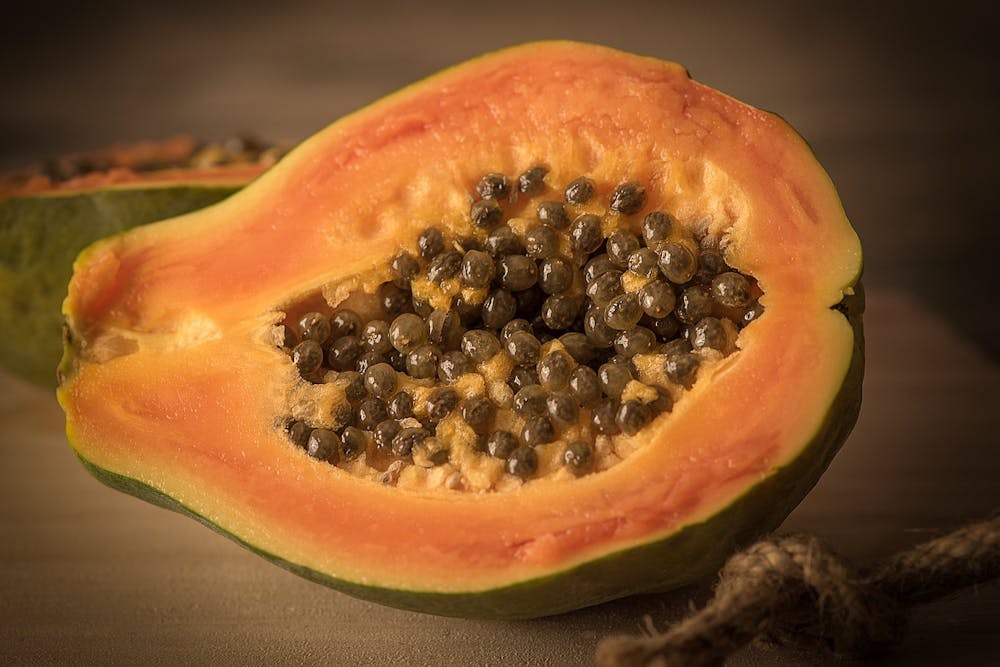
2. Pomegranate
Pomegranate offers many health benefits for your gastrointestinal and skin health. It is a great anti-aging component as it contains vitamin C and polyphenols. It can protect your skin cells from oxidative damage and reduce inflammation. Moreover, pomegranates include dietary fiber, which helps to improve gut health and digestion. Its anti-inflammatory properties can reduce the symptoms of irritable bowel syndrome. Hence, adding this juicy fruit to your diet can heal your gut health and skin connections.
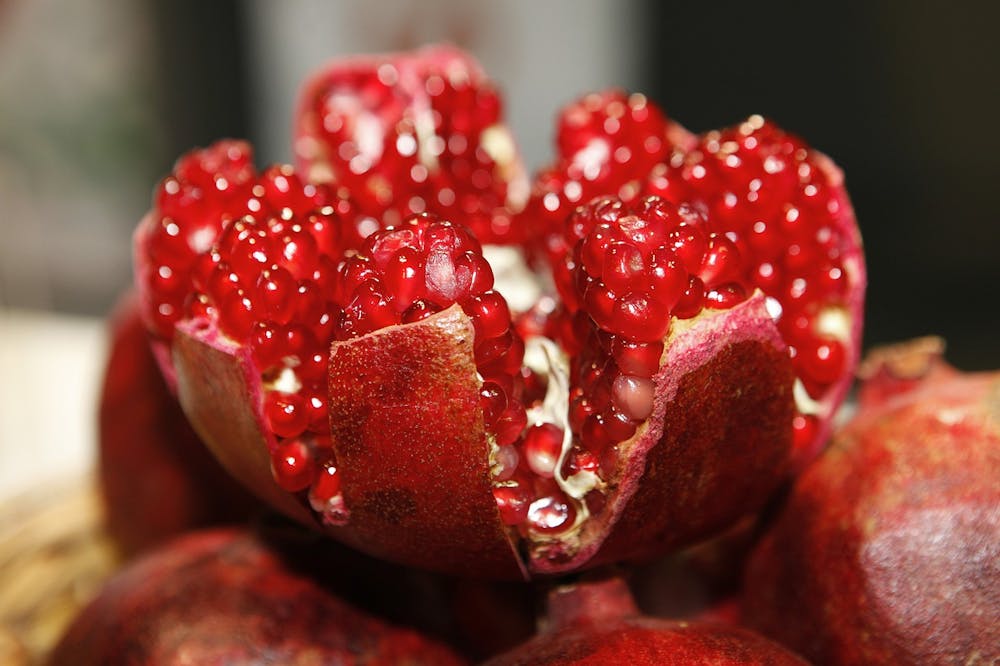
3. Almonds
Grab a handful of almonds if you're looking for a snack that's delicious and healthy! These crunchy nuts are nutrient-rich and can help your gut issues causing acne. Almonds are also a rich source of vitamin E which is believed to keep skin bright and bring a radiant glow from the inside out. Moreover, they contain fiber, which can support healthy digestion and intestinal function. Studies have shown that eating almonds can help lower gut inflammation. Almonds also encourage the development of good gut bacteria.
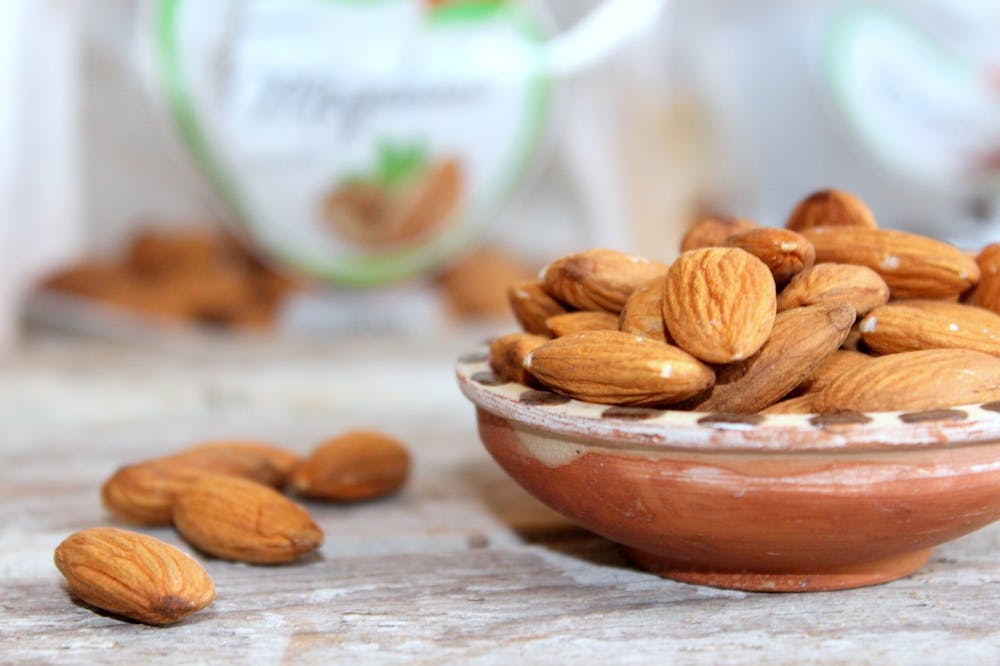
4. Walnuts
This is another tasty and healthy nut for your gut health and skin issues. Walnut is packed with nutrients that can improve your overall health. Walnuts contain Omega-3 fatty acids, which can help you maintain healthy and youthful-looking skin. They also include fiber that encourages regular bowel movements and also lowers inflammation. So grab a handful of walnuts next time you're craving a delicious snack.
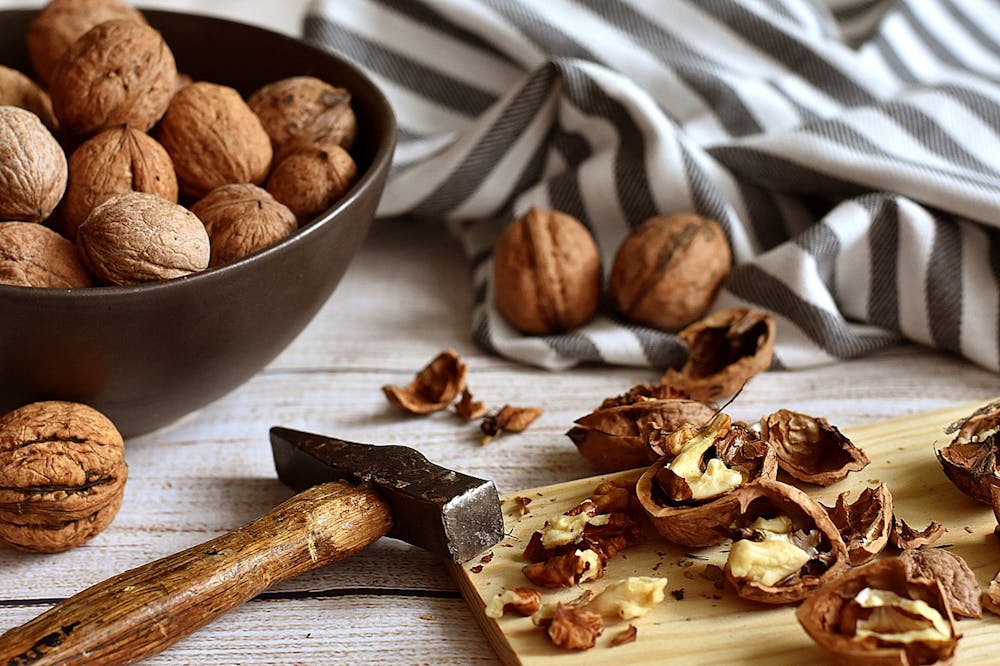
5. Leafy Green Vegetables
Leafy green vegetables are a nutritional powerhouse that can improve the health of both your stomach and skin. Leafy greens are a rich source of antioxidants, which can protect your skin from free radical damage. They also include a lot of fiber, which supports a healthy digestive system, reduces constipation, and feeds the gut bacteria. It can help lower the chance of developing chronic diseases including heart disease, diabetes, and cancer.
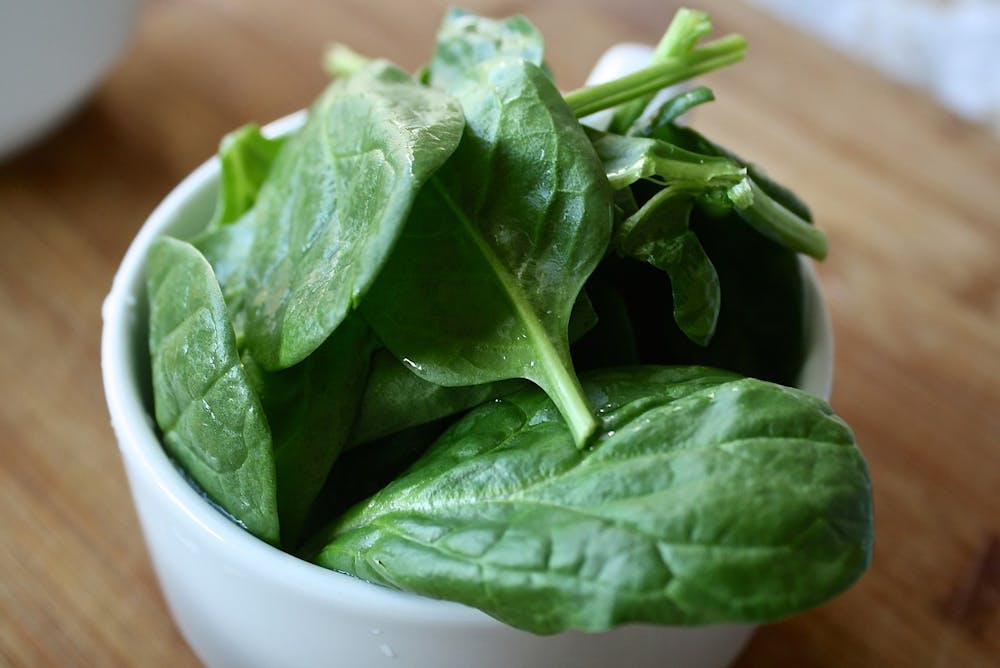
6. Sweet Potatoes
Sweet potatoes are a popular root vegetable that can improve the health of both your gut and skin. It contains high levels of beta-carotene and anthocyanins that can prevent your skin from aging and cellular damage. The fiber content present in sweet potatoes helps in regular bowel movements and healthy digestion. Sweet potatoes contain vitamins A and C . It encourages healthy skin cell formation and immunity-boosting processes.
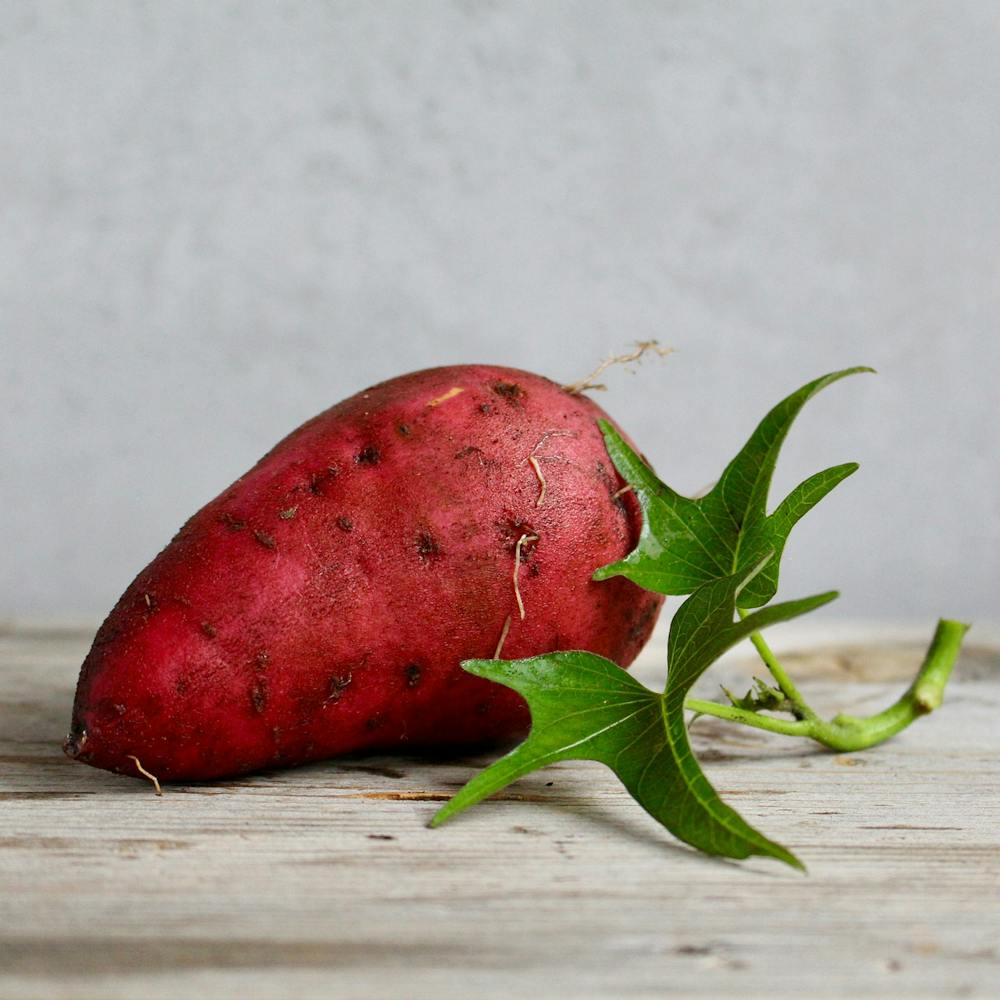
7. Carrots
These bright and crunchy vegetables are packed with vitamins and minerals. Just like sweet potatoes, carrots are also high in beta-carotene. This antioxidant is essential for the formation and maintenance of healthy skin cells. Carrots also contain dietary fiber that helps in digestion and prevents constipation. These crunchy orange-hued veggies can also prevent you from the risk of developing cancer, diabetes, and heart disease.

8. Bell Peppers
You might have seen these colorful veggies in local markets, but do you know how beneficial these are for your gut and skin health? Bell pepper contains vitamin C which keeps your skin looking young and supple. They also contain high dietary fiber that maintains the health of your digestive system. Its countless health benefits have been included in the group of best foods for heart disease.

9. Whole Grains
Whole grains are the best option if you're looking for an easy and delectable way to boost the health of your skin and gut. These nutrient-rich foods are full of fiber, vitamins, and minerals that can help to improve your overall health. It contains carbohydrates which are slowly digested by our body to provide energy. Consuming whole grains daily can help you prevent constipation and protects you from many serious diseases.
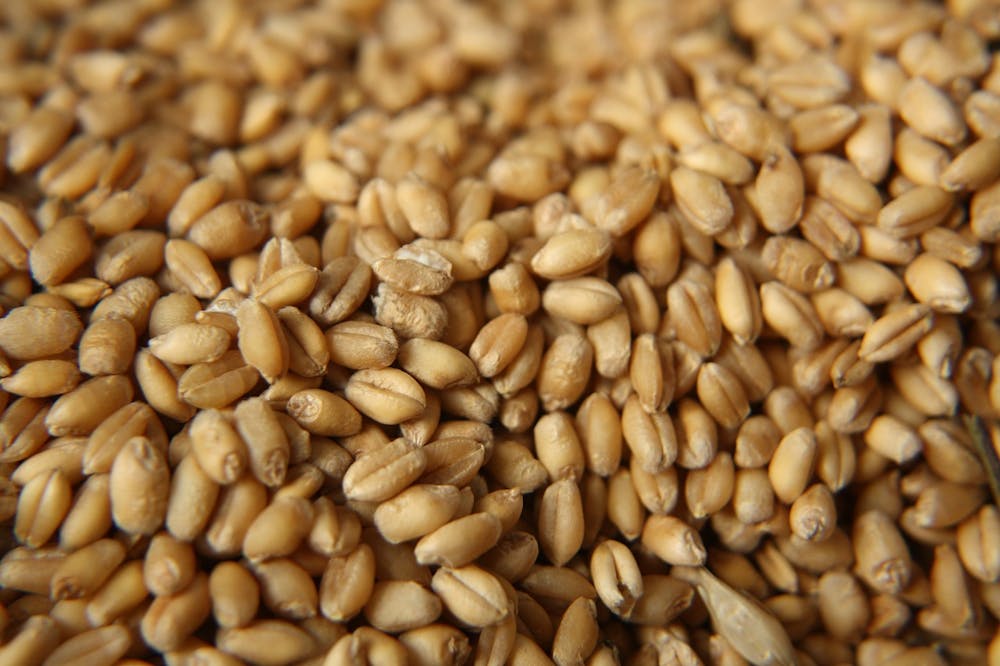
10. Pumpkin Seeds
Another simple way to heal your gut inflammation and skin issues is by adding pumpkin seeds to your diet. It is an excellent source of nutrients that are good for the skin and digestive health. They also contain zinc necessary for healthy skin cell development and reduces redness and skin irritation. Pumpkin seeds also contain fatty acids, which keep your skin healthy and hydrated.
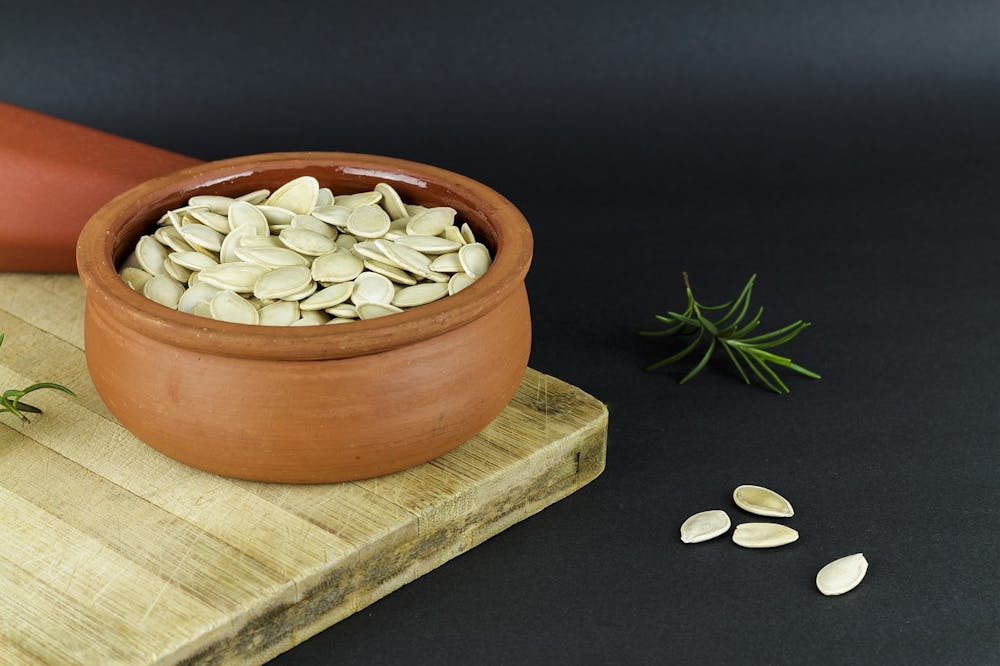
11. Sesame Seeds
These small seeds are an excellent source of vitamins and minerals that improves your overall health. The fiber-rich sesame seeds can help you in promoting healthy digestion by nourishing your gut bacteria. They are also rich in antioxidants, which support healthy skin cell growth. Sesame seeds also contain vital minerals like zinc and copper, which produce collagen and keep your skin looking young.
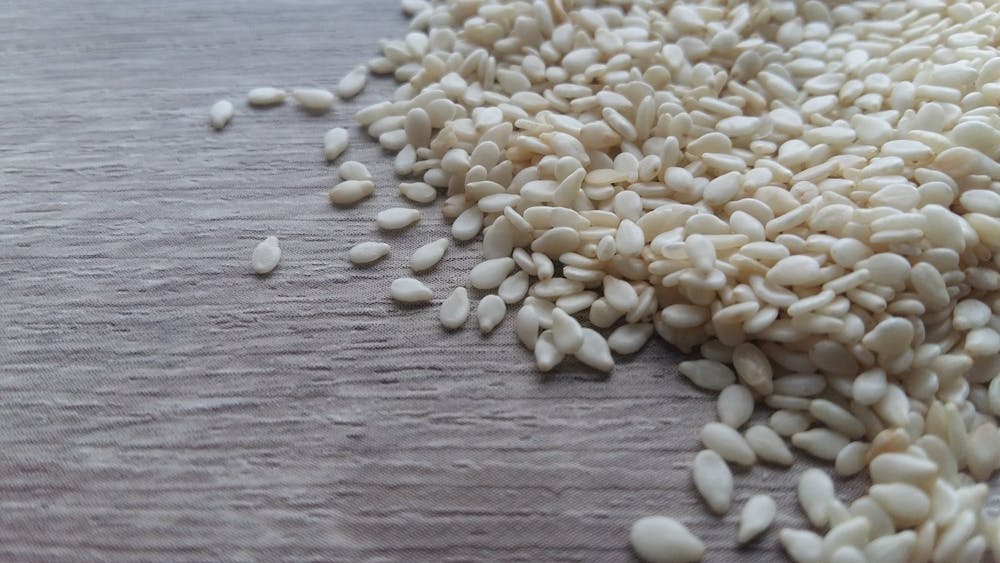
How Can You Improve The Gut Skin Connection?
- You should avoid meals that are heavy in sugar, processed carbs, and unhealthy fats. They can cause inflammation in the body, which can harm the skin and the intestines.
- Drinking lots of water helps support good digestion and keep your skin hydrated.
- Long-term stress can harm your digestive system and worsen skin issues. Therefore you must practice meditation, or physical activity to strengthen your gut-skin connection.
- Sleep deprivation can also affect your gut health and worsen skin issues. Hence, you must develop good sleeping habits for a healthy gut and skin.
- Excessive smoking and alcoholism can harm the stomach lining and disturb the gut bacteria, which harms skin health. Therefore, you must give up these habits immediately to live a healthy life.
Final Thoughts-
Now, once you have gone through the entire blog, you might have understood the strong connection between gut and skin health. Thus, taking care of your stomach can result in healthier and better-looking skin. You must adopt a plant-based diet, stay hydrated, manage stress, and get adequate sleep to stay fit. Don't forget to consult a doctor if you have ongoing skin or digestive problems.
Frequently Asked Questions –
Is There A Link Between Skin And Gut Health?
Yes, several studies suggest that there is a link between skin and gut health. Your diet and gut microbiome can impact your skin's health and appearance.
Can Healing Your Gut Help Your Skin?
Healing your gut can potentially make your skin healthy. You can start experiencing improvements in your skin health as soon as you opt for a healthy diet and lifestyle changes.
How Do I Get A Healthy Gut For Clear Skin?
You should start eating plenty of fruits, vegetables, and legumes and stay hydrated to improve your skin and gut health. Make sure to avoid processed food, sugar, and alcohol to promote good gut health.
How Does Gut Microbiome Impact Skin Health?
The gut microbiome can impact your skin health by affecting the skin's natural barrier function. An imbalance in gut bacteria can lead to skin conditions such as acne, eczema, and psoriasis.
Is Your Skin A Reflection Of Your Gut?
Yes, your skin and gut health are interconnected. An unhealthy gut can contribute to skin problems, while a healthy gut can promote clear and glowing skin.
How Does Your Gut Health Affect Your Skin?
Your gut health can affect your skin by influencing immune function, and hormone regulation.
How To Maintain Skin Elasticity?
You should protect your skin from sunlight, and start consuming a plant-based diet. A proper skincare routine and avoiding smoking can also help you to maintain skin elasticity.
Can Gut Issues Cause Skin Problems?
Yes, an imbalance in gut bacteria can lead to inflammation and other issues that contribute to skin problems such as acne, eczema, and many more.
Can Leaky Gut Cause Skin Problems?
A leaky gut can sometimes cause skin problems due to increased inflammation and oxidative stress. It can result in skin conditions like eczema, psoriasis, and acne.
How To Check Skin Elasticity?
You can check skin elasticity by gently pinching a small area of skin on your cheek. If the skin bounces back quickly, it is considered to have good elasticity. If it takes longer to return to its normal position, it may indicate a loss of elasticity.
Can Leaky Gut Cause Itchy Skin?
Yes, a leaky gut causes itchy skin due to the increased production of inflammatory cytokines. It can lead to skin problems such as eczema, psoriasis, and hives.
Are There Any Natural Remedies That Can Improve Both Gut And Skin Health?
You can consume nuts and pumpkin seeds as a natural supplement to improve your gut and skin health.




